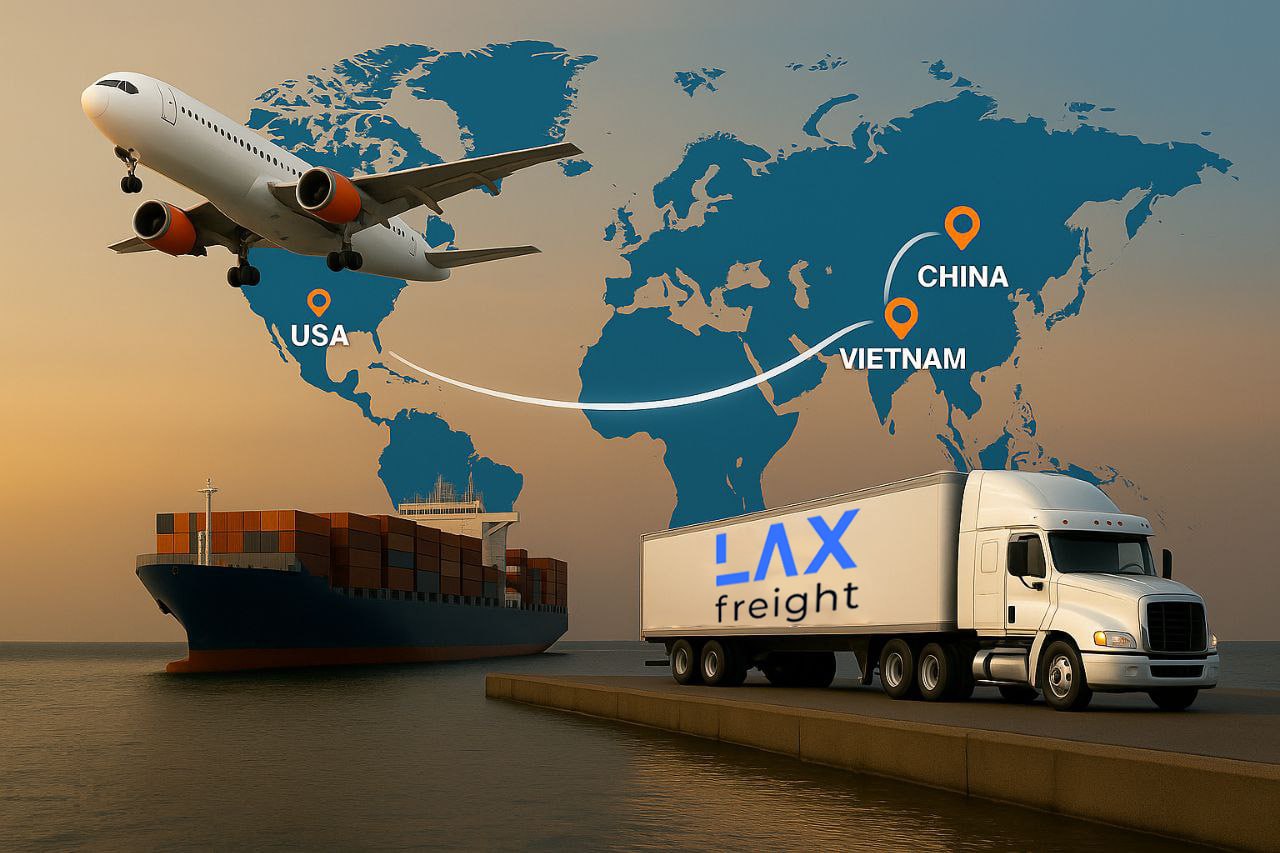Nowadays, many businesses must adapt to changing market demands and consumer requirements in order to succeed. In addition, customers demand fast and low-cost delivery that may require supply chain processes to be upgraded. This can be reached with various tools and innovative solutions like freight management software, digital freight platforms, artificial intelligence, and cloud-based platforms. They allow for handling complex logistics tasks, ensure real-time visibility, and improve cost efficiency. Thus, these tools are becoming essential in streamlining the delivery processes and enhancing supply chain operations.
This article delves into the key challenges businesses encounter in freight management, highlights the essential tools and digital technologies transforming the industry, and provides insights into choosing the right solutions. Discover how LAX Freight can simplify your logistics journey with tailored solutions, end-to-end supply chain management, and comprehensive support.

Key Challenges in Freight Management
Freight management involves navigating complex logistics tasks, such as coordinating shipments, managing carriers, and ensuring timely deliveries. Despite advancements and innovative solutions, businesses may face significant challenges in their freight operations, especially with the use of diverse networks. These include balancing operating and delivery costs, maintaining load capacity, ensuring seamless warehouse management, and meeting customer requirements.
A primary difficulty is achieving supply chain transparency. Without access to real-time tracking, companies struggle to monitor their loads, anticipate delays, and proactively manage disruptions. This can also lead to missed delivery windows, unhappy customers, and financial strain. In addition, fragmented systems make it challenging to streamline the freight management process, leaving manual tasks prone to errors and inefficiency.
Companies may use technological solutions to overcome these hurdles. Solutions, such as freight management software, automate manual tasks, allowing businesses to streamline freight processes and reduce costs. In addition, digital freight matching platforms can seamlessly connect shippers and carriers. This simplifies freight forwarding operations and enhances supply chain processes through a single platform for shipment tracking and maintaining real-time visibility.
Besides, modern freight management tools are designed with features like digital documentation, automated workflows, and comprehensive data analytics. These capabilities generate data-driven insights for improving decision-making while ensuring data security. By incorporating user-friendly logistics software that supports global trade, businesses can improve customer visibility, achieve higher efficiency, and ultimately enhance customer satisfaction.
Addressing these challenges through digital transformation can help businesses create an agile and adaptive freight management process that supports sustainable business success and optimizes their supply chains.
Essential Tools for Streamlining Freight Management
Leveraging the right tools can significantly improve the freight management process in the modern logistics industry. For example, they allow businesses to address obstacles more effectively and optimize operations. By adopting these freight management tools, companies can streamline operations, reduce costs, and improve overall efficiency while staying competitive in a rapidly evolving industry.
Freight Management Sofware (FMS)
Freight management software is a cornerstone for automating and simplifying freight operations. These tools create a united platform for tracking and managing freight shipments, optimizing delivery schedules, and streamlining logistics tasks.
Advanced FMS solutions offer real-time visibility, predictive analytics, and automated workflows, enabling businesses to make data-driven decisions and reduce operational costs.
FMS integrates systems for shipment tracking, compliance management, and route optimization, helping companies improve carrier performance while ensuring regulatory compliance.
Inventory Management Systems
Effective inventory management is essential for maintaining seamless logistics operations. Modern stock management systems allow businesses to monitor stock levels, forecast demand, and reduce storage costs. With data analytics instruments, you can forecast demand fluctuations to align your stock levels and avoid stockouts or overstocking.
By integrating these systems with digital freight management platforms, companies can synchronize their inventory and shipping processes, ensuring timely delivery. Warehouse management systems also utilize real-time data to generate actionable insights, supporting better decision-making and optimizing warehouse workflows.
Freight Rate Comparison Tools
Selecting cost-effective freight options ensures cost efficiency and stable business growth. Freight rate comparison tools enable companies to evaluate options from multiple carriers and choose the best pricing and service combination for each shipment.
Freight rate comparison tools consolidate carrier and historical and real-time data to provide valuable insights, helping businesses manage shipments and maintain profitability.
Digital Freight Platforms
Digital freight management platforms have the capabilities of digital freight forwarding, freight matching, and shipment data management in one comprehensive suite. Shippers and carriers can reach out to each other through these platforms. This reduces dependence on manual processes and enhances operational transparency.
Features like real-time tracking, digital documentation, and automated booking ensure smoother logistics operations while delivering an enhanced customer experience.
These platforms can also incorporate data analytics and machine learning to optimize carrier capacity and predict potential disruptions.
Advanced Technologies Shaping Freight Management
Technology continues to redefine freight management, providing tools and systems that streamline operations and drive innovations for the supply chain. By embracing advanced solutions such as artificial intelligence (AI), the Internet of Things (IoT), and cloud-based platforms, businesses can achieve greater efficiency, reduce costs, and enhance the overall supply chain process.
Artificial Intelligence
Artificial intelligence (AI) provides various tools for various sectors and operations. For cargo supplies, it can provide predictive analytics to analyze historical data, forecast demand, and optimize delivery and production. AI algorithms also facilitate freight matching, ensuring the right shippers and carriers are connected based on their specific needs, reducing expenses, and minimizing delays.
AI enhances supply chain transparency by identifying potential disruptions and suggesting contingency plans. Additionally, AI-powered tools automate time-consuming manual processes such as scheduling, billing, and compliance checks, freeing logistics professionals to focus on more strategic tasks. With actionable insights derived from large datasets, companies can adapt quickly to changing market demands and improve decision-making throughout the freight management process.
Internet of Things
The Internet of Things (IoT)can bring a new level of connectivity to the logistics process. For instance, yoit offers a way to track shipments in real-time. This connectivity enhances supply chain management by delivering real-time tracking, improving logistics operations, and ensuring timely deliveries.
IoT also assists in optimizing routes, reducing fuel consumption, and enhancing vehicle maintenance schedules. By offering consistent and reliable service, these capabilities improve operational efficiency and bolster customer satisfaction.
Cloud-Based Platforms
Cloud-based platforms can also be transformative tools for the right management. They offer a centralized platform for managing every aspect of load delivery operations and consolidating shipment data. This enables businesses to operate seamlessly across teams and assets.
A robust cloud-based freight management software (FMS) eliminates the need for on-premises infrastructure, reducing overhead costs while providing real-time visibility into shipments, inventory, and compliance statuses. Additionally, their scalability ensures that businesses can grow without facing system limitations.
How to Choose the Right Tools for Your Business
Choosing the best tools for your freight management strategy is critical to ensuring your business operates efficiently while meeting the needs of customers and stakeholders. The right technology helps manage day-to-day tasks, improves supply chain operations, enhances productivity, and provides a competitive edge.
Still, defining what tools are needed and will be the most suitable for your business operations is essential.
Assess your logistics needs. Start by evaluating your current logistics processes and identifying your needs. Understanding the areas of improvement will help you target the tools that address specific operational gaps, whether they involve shipment monitoring, freight matching, or managing inventory levels.
Focus on scalability and flexibility. The logistics industry is constantly evolving. Choose flexible solutions to adapt to changing customer demands, regulatory updates, and supply chain complexities. You may need scalable tools like a digital freight matching platform, which will allow you to add features as your operations grow.
Prioritize user-friendly interfaces. Effective software should be easy for you and your employees to use. A user-friendly interface reduces training time, improves system adaptation, and minimizes errors in tasks like managing shipping documentation, monitoring carrier data, and processing compliance requirements.
Evaluate costs. Affordability is crucial, but so is ensuring your investment delivers measurable benefits. Compare the costs of potential tools with the anticipated returns. This can involve increased operational efficiency, expense reduction, or enhanced customer experience.
Check for integration capabilities. A strong tool should work seamlessly with your existing technology stack, including load delivery management tools, accounting systems, and warehouse management systems. Integration across platforms simplifies the flow of information, enhances collaboration, and ensures a consistent approach.
How LAX Freight Services Can Streamline Freight Management
At LAX Freight, we understand the complexities of managing delivery operations in today’s fast-paced and competitive economy. Our commitment to innovation and efficiency allows us to offer businesses the tools and expertise to overcome challenges and streamline processes of the supply chain.
With LAX Freight as your partner, you’ll gain access to top-tier logistics expertise, advanced digital platforms, and practical solutions that empower your business to thrive in the competitive logistics environment.
Tailored Freight Solutions
We understand that every company has unique logistics needs. That’s why LAX Freight offers tailored freight solutions that align with your needs and preferences. Whether you’re a small business or a more extensive operation, we work closely to optimize costs, improve load capacity, and simplify delivery processes.
By leveraging cutting-edge technology and partnering with reliable shippers and carriers, we help reduce delays, ensure real-time delivery tracking, and provide visibility into your freight shipments.
End-to-end Freight Management
LAX Freight offers comprehensive end-to-end freight management services. We can cover every aspect of your shipping process, from planning and execution to monitoring and delivery.
Our team ensures your freight moves efficiently across its route, focusing on timely and safe delivery. Advanced capabilities allow businesses to reduce manual processes, streamline operations, improve their supply chain visibility, and control operational costs.
Comprehensive Support
LAX Freight believes in providing businesses with more than just tools— we deliver ongoing, comprehensive support that drives business development. Whether you need assistance with cargo delivery, shipment tracking, or ensuring the best supply rates, our expert team works with you to ensure your logistics processes operate smoothly and efficiently.
Conclusion
The ever-evolving world of freight management demands that businesses embrace digital innovation to stay competitive. By leveraging tools like supply chain management software, inventory and warehouse management systems, and advanced digital technologies such as artificial intelligence and the Internet of Things, companies can overcome operational bottlenecks, improve customer experience, and achieve business growth.
Selecting the right tools and partners tailored to your requirements is crucial for navigating today’s dynamic logistics landscape. LAX Freight offers tailored services and expert guidance to empower businesses with seamless logistics operations and a reliable partner in their supply chain journey. With the right support and technology, you can elevate your delivery operations to new heights, ensuring efficiency, visibility, and success in a competitive market.


